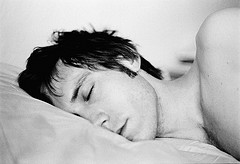
 With the warmer weather, a lot of us are waking up in the middle of the night hot, and sweating-especially if we’re lacking an air conditioner! But if you’ve got cancer, you may be experiencing true night sweats-severe hot-flash type sweating that drenches sleepwear and sheets, may be accompanied by a flushing sensation or chills, and isn’t related to an overheated environment.
With the warmer weather, a lot of us are waking up in the middle of the night hot, and sweating-especially if we’re lacking an air conditioner! But if you’ve got cancer, you may be experiencing true night sweats-severe hot-flash type sweating that drenches sleepwear and sheets, may be accompanied by a flushing sensation or chills, and isn’t related to an overheated environment.
“My husband has a Non-Hodgkins Lympoma,” says caregiver mickigirl, “and he has had 3 chemos so far. He is still getting the night sweats though, and we thought they’d be gone by now.”
“I am just curious if anyone knows what exactly is it about cancer that causes night sweats?” says fighter Terri. “I have had them on & off for many years & kinda thought it was due to pre menopause or something. Now that I have been diagnosed with cancer, I feel it might be because of cancer, not exactly sure.”
If you’re suffering from night sweats as a side effect of cancer or cancer treatment, you’re not crazy. Medically termed “nocturnal hyperhydrosis,” night sweats can be caused by Hodgkin’s disease or other forms of cancer. “Night sweats are an early symptom of some cancers,” says webmd.com. “The most common type…is lymphoma.” Breast-cancer drugs like tamoxifen, as well as certain types of chemotherapy (if they drain the body of estrogen) can bring on menopausal symptoms like night sweats as well.
Scientists aren’t sure what causes night sweats, but speculate that cancer cells release certain hormones during sleep that trigger the reaction. Medications can also interfere with the body’s natural temperature regulation.
“My sister is going through chemo,” says caregiver livinlouder, “and although the nausea was not as profound this time thanks to the meds, her night sweats are terrible. She has to change several times during the night, and the mattress and bed clothes are soaked.”
If you’re suffering this side effect, what to do? First of all, if you haven’t been diagnosed with cancer, check with your doctor about your symptoms. Night sweats can indicate cancer, but can also be a sign of many other health problems, including menopause, hypoglycemia, HIV, hormone disorders, infections, neurological conditions, and more. If it’s possible you’re experiencing menopausal symptoms as a side effect of cancer treatment, your doctor may have medications to help.
Change your sleepwear to something made of a moisture-wicking material, like Cooljamaz sleep wear or Wickers underwear. You may want to consider sage tea before bedtime (find the recipe on this link). A 2005 study found that sage and alfalfa reduced hot flushes by 60% compared to a placebo. Acupuncturist John Richard Roberts suggests you avoid caffeine or alcohol for about 3 hours before bed, cut down on spicy foods, keep your bedroom cool (consider a fan near the bed), drink water if and when you do wake up, and incorporate a relaxing routine at night that includes meditation and deep breathing or yoga (not vigorous exercise). Speaking of acupuncture, former Prevention alternative-medicine editor Sara Altshul recommends it for relief, based on research showing its ability to reduce hot flashes.
Finally, an interesting product you may want to try-the Bedfan. It’s a little gadget that sits at the foot of your bed and provides a breeze between your sheets and along your body.
Do you have any ideas on relieving night sweats? Please share them with us.
Photo courtesy of fruitbat20 via Flickr.com.

